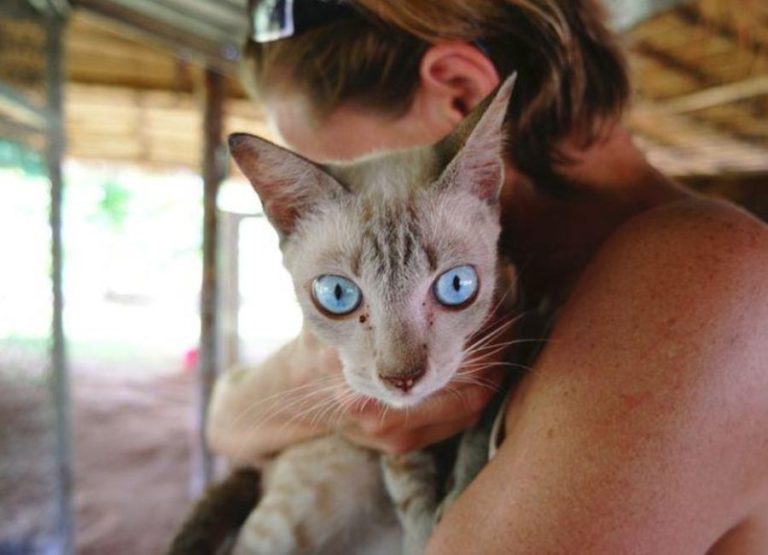How Do Indoor Cats Get Parasites: 10 Ways To Note

People ask how do indoor cats get parasites a lot, and in this post, we will outline all the ways a cat can get parasites.
Getting parasites is a common problem among cat owners, and there are many ways an indoor cat can get parasites.
Let’s find out common ways indoor cats get parasites together…
How Do Indoor Cats Get Parasites?

Indoor cats can get worms by hunting insects or rodents that carry worm eggs, they can also get worms by coming into contact with fleas, eggs, or infected particles in feces.
Additionally, indoor cats can get heartworms from mosquito bites.
Fleas can easily overwinter in homes, and mosquitoes can find their way indoors, making it possible for indoor cats to get parasites.
To protect indoor cats from parasites, owners can use preventative measures such as flea and heartworm medication.
Learn more about the side effects of cat dewormers.
Ways indoor cats get parasites
Here are some basic and simple ways an indoor cat can get both internal and external parasites:
1. Chasing an Infected Mouse
This is one of the major ways indoor cats contract parasites.
Mice are rodents that carry a lot of parasites and diseases because of where they live and what they eat.
A cat can easily get parasites from chasing after an infected mouse.
Mouse always find their way into our home, and we have known cats to go after a mouse.
A cat can also get a parasite by crossing the path of an infected mouse.
2. Eating an Infected Mouse
An indoor cat can also get an internal or external parasite by eating an infected mouse.
Mice are a host of many parasites and diseases, this is basically because of where mice live or what they eat.
It is not a good practice to allow an indoor cat to feed on mice, as this can get an indoor cat sick.
Indoor cats can still hunt down mice when you are not looking or when you are away from home.
So it is a good practice to always vaccinate your indoor cat against all sorts of parasites and diseases.
3. Gardens or Flowers Within Their Compound
A cat can get parasites from walking around the flowers or gardens within your home.
Flowers and grasses harbor parasites a lot, and when an indoor cat walks through these flowers, they come in contact with the parasites.
An indoor cat can parasite by just rubbing its body against the flowers or grasses in your compound.
4. Dirty backyard or basements
Indoor cats are known to sneak into the backyard or basements in search of a cool place to take an afternoon nap.
If you have a backyard or basement that you don’t often use, it’s a good place your cat can get infected with parasites.
Moreover, these backyards or basements are also hiding places for mice which makes it easier for cats to get parasites.
5. Unkept Litter Box
When you allow your indoor cat poop to stay for so long that the cat has to revisit the litter box or tray again having old poop.
Cat poop ferments over time and can grow these parasites that can get your indoor cat sick.
Be sure to scoop or keep your cat litter box or trays clean, as this cat transfers internal or external parasites to your cat.
6. Contact With Other Infected Pets
When you are away for work, don’t be too sure your cat can not come across other outdoor cats.
Your cat can get into a fight with an infested outdoor cat that is encroaching on its territory.
By chasing after other pets, your indoor cat can easily get parasites.
Your indoor cat can also get parasites by crossing the pathway of another infested pet.
7. Dirty Human Footwear
Your cat can get parasites by walking through where you kept your dirty footwear.
When you walk from outside into your home, don’t be too sure your shoes are not carrying any form of parasites under them.
Parasites can be found everywhere, even on human pathways, and these parasites can stick to the base of your footwear.
8. Potted Plants Around Your Home
Cats can get parasites from coming in contact with the potted plants around your home.
Parasites can live in the soil used for potting the plants or flowers we keep around our home.
When your cat comes in contact with this soil, there is a high chance your cat can get a parasite from this soil.
9. Through Grooming
Indoor cats can get parasites by grooming themselves.
A cat uses its paws to groom itself, and this can lead to the injection of any form of parasites.
Cats are known for licking themselves and this can lead to an indoor cat injecting a parasite that sticked at its body.
10. From Mosquitoes and Flies
Indoor cats can get parasites from mosquito bites or fly around their territory.
The type of worm cats can get from mosquitoes is known as heartworms.
Types of Parasites That Attack Cats
There are two basic types of parasites that attack indoor or outdoor cats, which are as follows;
External Parasite That Attacks Cats (Ecto Parasite)
These are groups of parasites that attack the skin of a cat and are found on the layers of a cat’s skin.
External parasites feed on the skin of the cat, grow big and sometimes multiply externally.
Examples of External Parasites That Attack Cats
- Ticks
- Fleas
- Mites
- Lice
Internal Parasites That Attack Cats (Endo Parasites)
Internal parasites are groups of parasites that attack the internal organs of a cat.
Most of the internal parasites live in other animals. An example is the tapeworms that can be carried by fleas.
Examples of Internal Parasites That Attack Cats
- Tapeworms
- Roundworms
- Heartworms
- Hookworms
- Whipworms
Here are 11 things that scare an indoor cat.
Do indoor cats need rabies shots
Yes, indoor cats need rabies shots since rabies is a fatal disease for people who get bitten by cats. Therefore, every indoor cat should get a rabies shot.
The law requires rabies vaccines for all cats above the age of six months in most countries and states like New York state.
Do not think twice about giving your cat a rabies shot if you have kids at home.
Symptoms of Parasite Attacks in Cats
Here are the common symptoms of parasite attacks in cats:
- Weight loss: Intestinal parasites such as hookworms, roundworms, and tapeworms compete with their host for nutrients, which can lead to weight loss in cats.
- Diarrhea: A common symptom of parasite infestation, diarrhea can be caused by protozoans such as giardia and coccidia, as well as intestinal worms.
- Vomiting: Some cats may vomit as a result of parasites irritating their digestive systems.
- Dehydration: Diarrhea and vomiting can lead to dehydration, which can be particularly dangerous for kittens and senior cats.
- Changes in appetite: Some cats may lose their appetite or refuse to eat as a result of parasite infestation.
- Dull coat: Parasites can also deplete nutrients from a cat’s body, which can lead to a dull coat and other skin and coat problems.
- Coughing and wheezing: Lungworms and heartworms can cause coughing and wheezing in cats, particularly those with weakened immune systems.
- Anemia: Fleas and ticks are known to cause anemia in cats by feeding on their blood. Anemia can lead to weakness and lethargy.
- Behavioral changes: Cats may exhibit changes in behavior such as hiding, lethargy, and aggression due to the discomfort and pain caused by parasite infestation.
More on the symptoms of worms in cats.
Ways to keep parasites away from your indoor cat
Here are some of the common ways to keep parasites away from your indoor cat:
- Regular grooming: Brushing and combing your cat’s hair regularly can help prevent and identify any signs of parasites.
- Use flea and tick prevention: There are a variety of flea and tick prevention products available, including topical treatments, collars, and oral medications.
- Keep your home clean: Vacuum and sweep your floors regularly to eliminate any fleas or ticks that may be in your home.
- Keep your cat indoors: Keeping your cat indoors can significantly decrease the risk of contracting parasites.
- Regular vet visits: Scheduling regular visits with your veterinarian can help identify and prevent parasite infestations.
- Deworm your cat: It’s important to deworm your cat regularly to prevent worms and other intestinal parasites.
- Properly dispose of cat waste: Make sure to dispose of cat waste properly to avoid potential exposure to parasites.
- Avoid raw food diets: Raw food diets can increase the risk of parasitic infections, so it’s best to avoid them.
- Avoid contact with outdoor cats: Outdoor cats are at a higher risk of parasite infestations, so it’s best to avoid contact with them if possible.
Learn more about how cats can get worms from dogs.
What vaccines do indoor cats need
Here are the vaccines every indoor cat needs according to WebMD;
- Feline calicivirus shot
- Rabies shot
- Feline leukemia shot
- Bordetella shot
- Feline viral rhinotracheitis shot
- Panleukopenia shot
Find out more about how it takes for a worm to leave a cat after deworming.
Frequently Asked Questions
Can indoor cats get parasites?
Yes, indoor cats can still get parasites. Although indoor cats are less likely to be exposed to parasites than outdoor cats, they can still be exposed through contact with other animals or through their food, water, or litter boxes.
How do indoor cats get fleas?
Indoor cats can get fleas from contact with other pets or wildlife, or from exposure to flea-infested environments such as kennels or groomers.
Fleas can also hitch a ride on people’s clothes or shoes.
Learn more about how indoor cats get fleas.
How do indoor cats get worms?
Indoor cats can get worms by ingesting infected feces or by eating infected prey, such as rodents or birds.
They can also get worms through exposure to contaminated soil or other environmental sources.
Learn more about different ways indoor cats get worms.
What are the symptoms of parasite infections in indoor cats?
Symptoms of parasite infections in indoor cats can include vomiting, diarrhea, weight loss, and a dull coat.
In the case of fleas, you may notice your cat scratching excessively or developing scabs or hair loss on their skin.
How can I prevent my indoor cat from getting parasites?
To prevent your indoor cat from getting parasites, you can take a number of steps, such as keeping their litter box clean, washing their food and water bowls regularly, and keeping them away from other animals that may be infected. You can also talk to your vet about preventative medication.
How can I treat my indoor cat if they do get a parasite infection?
Treatment for parasite infections in indoor cats depends on the type of parasite they have.
Your vet may prescribe medication or recommend other treatments such as specialized shampoos or flea collars.
Regular vet check-ups can help to catch and treat any infections early.
Learn more about how you can get worms from your cat.
Conclusion
In conclusion, indoor cats can get parasites in a variety of ways, from fleas and ticks to contaminated food and water.
As a responsible cat owner, it’s important to take preventative measures such as regular vet check-ups, flea and tick treatments, and keeping your cat’s living space clean.
By following these simple steps, you can help keep your feline friend healthy and happy for years to come. Remember, a little prevention goes a long way!






![How Do Cats Get Leukemia [9 Top Ways] How Do Cats Get Leukemia](https://petcreeks.com/wp-content/uploads/2023/04/How-Do-Cats-Get-Leukemia-768x555.jpg)